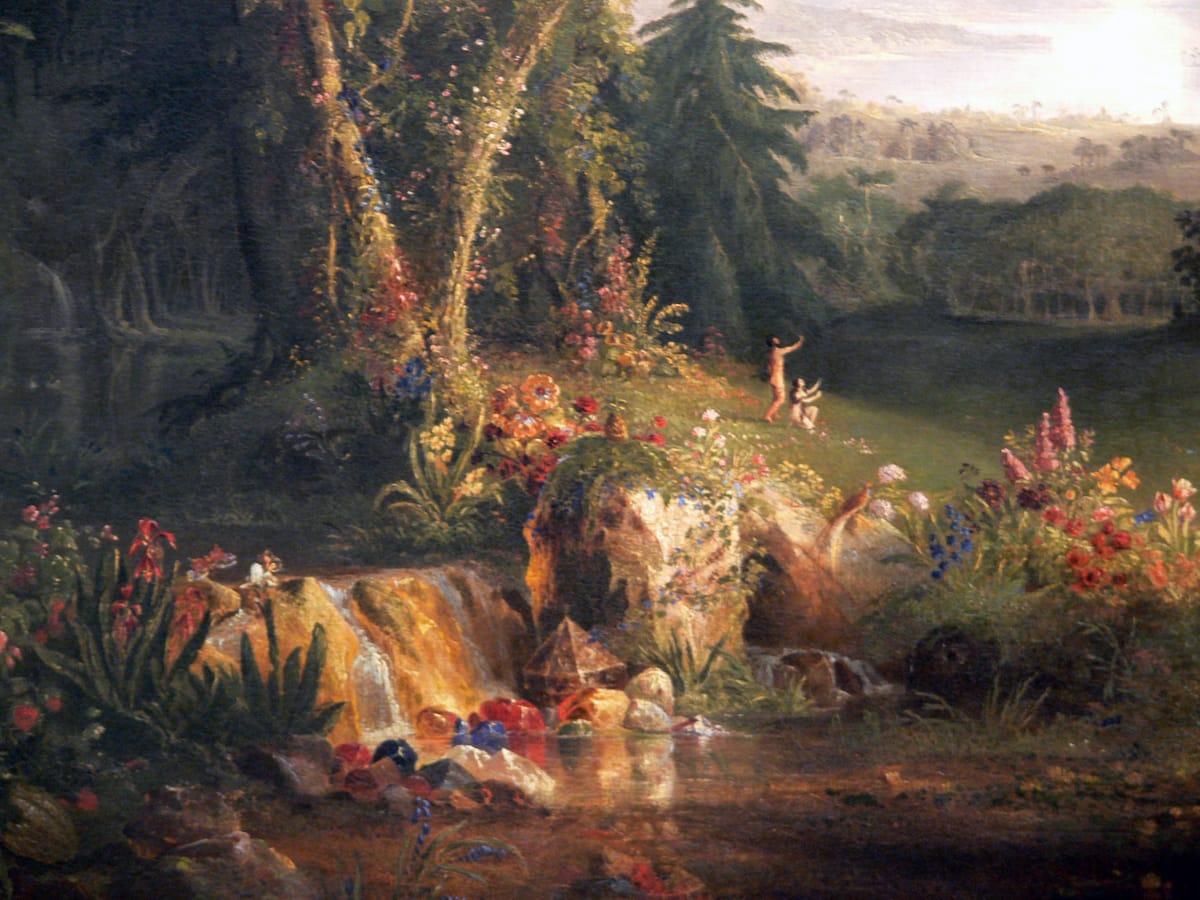Return to Eden
So many blogs in our house, so let's turn the sound up; You know why? I think it's time for an RPG Blog Carnival round-up!

I was very kindly offered to host the RPG Blog Carnival for the March just been, and I roguishly set the theme as “Over the Garden Wall - Beyond the OSR.” I asked collaborators to reflect on techniques from other roleplaying game play cultures, or from other sorts of play entirely, or even from their work or daily lives - all in service of how they might enrich the sort of “Old-School Revisionist” style of adventure gaming I have come to particularly enjoy, and often discuss on this blog.
For my part, I contributed the following posts through March on the topic:
- Over the Garden Wall: March RPG Blog Carnival
- Officious Storygame Regulations - Stakes
- Paint the (Un)scene
- OSR - Status
But the wonderful thing about this tradition is that it’s not just all down to me! Several of my fellow kith and kin heeded the call to arms, mustering the following warband of musings for our collective enlightenment.
So many blogs in our house, so let's turn the sound up;
You know why? I think it's time for an RPG Blog Carnival round-up!
Histories in OSR Play
Luke over at Cats Have No Lords presents the Histories mechanic from Monster of the Week, and lays out how we can quickly add a handful of intra-party relationships (perhaps positively and negatively valent).

This looks like it would help a new group skip past the awkward “you all meet in a tavern” scene, while still letting us establish our characters a bit, before we start swinging swords and slinging spells. Juice for the table/character banter and friendly rivalries too - everyone wants a bit of that Legolas/Gimli energy when I’m playing D&D.
Reminds me to do something with the Entanglements of Hearts of Wulin, that establish conflicted relationship triangles between PCs and key NPCs. Also perhaps nab the Trust mechanic from Cold City, Hot War for a more adversarial style game like Paranoia. We could be doing more with “social tools/equipment” in this space.
Blades for OSR?
Marcin of VDonnut Valley considers how both the Load and XP trigger mechanics of Blades in the Dark could be adapted to dungeon delving elf- games.

I am surprised that I can’t recall ever seeing the Load approach really fleshed out for adventure gaming. I think the whole design lineage of playbook sheets for PbtA/BitD games presents a far better information presentation to onboard new players for character creation, and I’d much rather players reference equipment lists on the sheet in front of them than interminable shopping from the rulebook. The version of Load in Harpers’ Deep Cuts cleans up my biggest bugaboos with the original take as well.
The XP triggers aren’t a world away from ideas for XP per room or hex explored in a session, or XP for magic items in AD&D, or the 3d6DTL Feats of Exploration supplement. Reminds me of a nagging thought: what if rather than XP-for-gold, just actually lean into the material advantages of wealth, and play with gold-for-gold, a la Traveller?
Ideas to Patch into OSR play
Xaoseed of Seed of Worlds brings us a smattering of three thoughts from the broader rolling fields of tabletop role-play:
- Career character generation & advancement (Warhammer Fantasy RPG, Traveller, GLoG)
- Attrition beyond HP (Spire)
- Contacts mechanics (Shadowrun, World of Darkness)

Absolutely agree with each of these being fruitful voids to look at filling. Careers and cultures are far conceptually denser than ability scores in evoking a sense of character, and the process needn’t take much if any more time than rolling up your typical level 1 character and buying starting gear.
Tracking non-HP resources as old-school is well attested by Sanity in Call of Cthulhu, and arguably both the Credit and the Social Standing systems in Traveller. Contacts or social favours/debt fit in snuggly alongside this.
It’s often quoted “attack every part of the character sheet,” but the corollary is you should be putting more stuff on the sheet to attack in that case!
What OSR GMs Can Learn From Open World Video Games
Reese of Ward Against Evil lays out in considerable detail the level/world design lessons exemplified by three big-budget titles:
- Vantage Outposts, in Mad Max (2015)
- Most Wanted, in Batman Arkham Knight (2015)
- Collect-a-thons, in Far Cry 5 (2018)

I have played at least a bit of all three games, and I think these observations are spot on. The more active way of surveying from towers in Mad Max, or Breath of the Wild (BotW) for that matter, reinvigorated that hoary old Ubisoft motif: and the breadth of moorish ’capsule’ activities & expected rewards in Far Cry 5 goes well beyond the usual schema of Random Encounter, Lair, or (Mega-)Dungeon.
The lost Shrines of Dolmenwood have been a great driver of play for me - should we have Wizard’s Towers housing spell books & scrolls, or Trial Vaults containing sentient magic items locked away for civilization’s safety, until the need is so dire?
At the time I was very impressed by the environmental way-finding and sense of discovery in Batman Arkham Knight. This and BotW are actually the Landmark (my apologies) titles in this regard, being best-in-class at advertising their game-able content without just littering a map with so many exhausting crumbs for want of a good vacuum. Even seminal title The Witcher 3 fell foul of this, as I was ultimately downed and drowned off the isles of wreck-strewn Skellige, and I don’t think I shall ever go back.
Education Scaffolding for tRPGs
Finally, Panic Pillow of Tabletop Curiosity Cabinet had a lovely piece on applying the education theory of Scaffolding to OSR gaming.
I was already familiar with the theory of scaffolding, but hadn’t thought to apply it in this way before. We still don’t have many, if any, good texts to both teach the rules and culture of adventure game play side-by-side. Prospective initiates are usually directed to pickup one of the nigh uncountable retro-clones or ‘NSR’/artpunk games but then have to read essays like Principia Apocrypha, Primer for Old School Gaming, or Philotomy’s Musings. This leaves a large gap between theory and praxis.
My understanding is that Vince & Meguey Baker, Ben Milton, and Chris McDowall all have an education background as well. How about y’all help out bring the neophytes into the fold with some more scaffolding like this? Unsurprisingly, in conversation games, word choice and sentence construction matter.





